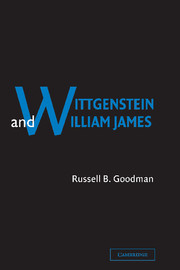Book contents
- Frontmatter
- Contents
- Preface
- Abbreviations
- Introduction
- 1 Varieties of Pragmatic Experience
- 2 Wittgenstein and The Varieties of Religious Experience
- 3 Wittgenstein and The Principles of Psychology: An Introduction
- 4 What Is It Like to Be a Human Being?
- 5 Language and Meaning
- 6 Pragmatism Reconsidered
- Coda
- Notes
- Index
1 - Varieties of Pragmatic Experience
Published online by Cambridge University Press: 23 July 2009
- Frontmatter
- Contents
- Preface
- Abbreviations
- Introduction
- 1 Varieties of Pragmatic Experience
- 2 Wittgenstein and The Varieties of Religious Experience
- 3 Wittgenstein and The Principles of Psychology: An Introduction
- 4 What Is It Like to Be a Human Being?
- 5 Language and Meaning
- 6 Pragmatism Reconsidered
- Coda
- Notes
- Index
Summary
In the last year of his life, Wittgenstein wrote: “So I am trying to say something that sounds like pragmatism. Here I am being thwarted by a kind of Weltanschauung” (OC, 422). What does Wittgenstein mean by “pragmatism” here, and what features of his position make it “sound like pragmatism”? Does Wittgenstein's position sound to him only or merely like pragmatism, without actually being pragmatism? What did Wittgenstein find hindering or obstructing him, and in what was he thwarted – the expression of his position, for example, or the appreciation of his position by others? In seeking answers to these questions I begin with a discussion of Wittgenstein's knowledge of pragmatism, then pass to a discussion of those themes of On Certainty to which Wittgenstein may have been referring, using James's Pragmatism as a point of reference. These questions can best be answered, however, through a consideration of Wittgenstein's longstanding relationship with writings by a founder of pragmatism, William James. This task will occupy the succeeding four chapters, after which we shall then return, in Chapter 6, to the question of Wittgenstein's relation to pragmatism.
The one explicitly pragmatist work we know Wittgenstein to have read is James's Varieties of Religious Experience. In his initial year of study at Cambridge, Wittgenstein sent a postcard to Bertrand Russell, in which he writes: “Whenever I have time I now read James's Varieties of religious exp[erience]. This book does me a lot of good.”
- Type
- Chapter
- Information
- Wittgenstein and William James , pp. 11 - 35Publisher: Cambridge University PressPrint publication year: 2002

